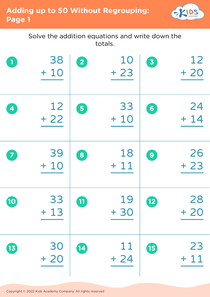Basic Addition Adding up to 50 with Regrouping Worksheets for Ages 6-8
3 filtered results
-
From - To
Discover engaging worksheets designed for children ages 6-8 that focus on basic addition with regrouping, specifically adding up to 50. Our carefully crafted materials help young learners develop essential math skills through fun, interactive exercises. With step-by-step guidance, students will gain confidence in tackling addition problems that involve carrying over values. These worksheets not only support academic growth but also encourage critical thinking and problem-solving abilities. Ideal for use at home or in the classroom, our resources aim to make learning math enjoyable and effective. Start your child's journey to mastering addition with our comprehensive and easy-to-use worksheets today!
Parents and teachers should prioritize Basic Addition with Regrouping for children aged 6-8 because it lays a foundational skill crucial for overall math proficiency. Mastering addition up to 50 is essential as it enhances children's ability to perform more complex calculations later in their educational journey. Regrouping, or carrying, helps students understand place value and the importance of breaking down numbers to get accurate results. This skill fosters critical thinking as children learn to approach problems methodically.
Furthermore, recognizing patterns in numbers through regrouping promotes numerical fluency. This fluency not only boosts a child's confidence but also encourages a positive attitude toward mathematics, essential for long-term success. As children engage in this skill, they develop perseverance and problem-solving techniques, which are valuable life skills beyond the classroom.
Additionally, strong addition skills serve as the groundwork for subjects that incorporate math, including science and everyday tasks like budgeting and cooking. Hence, by cultivating these skills in their young learners, parents and teachers help ensure a brighter academic future, equipping children with the tools they need for a variety of challenging concepts they will face as they progress through their education.













